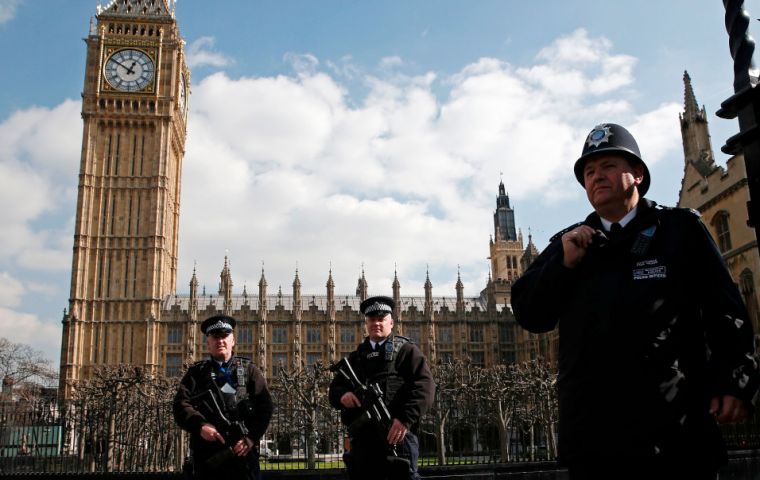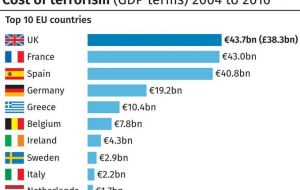MercoPress. South Atlantic News Agency
The terrorism 2004/2016 bill cost the UK 43.7bn Euros, says Rand Europe
 Incidents at Westminster, Manchester, London Bridge, Finsbury Park and Parsons Green may have led to a loss in economic output of around 3.5 billion Euros
Incidents at Westminster, Manchester, London Bridge, Finsbury Park and Parsons Green may have led to a loss in economic output of around 3.5 billion Euros  It was the highest sum across the 28 EU member states, followed by France with a loss of 43 billion Euros (£37.7 billion).
It was the highest sum across the 28 EU member states, followed by France with a loss of 43 billion Euros (£37.7 billion).  The report from research body RAND Europe calculated the potential costs linked to the wave of attacks that hit Britain last year.
The report from research body RAND Europe calculated the potential costs linked to the wave of attacks that hit Britain last year. Terrorism has hit the UK’s economy harder than any other EU country in recent years, according to a study. Analysis found the UK lost an estimated 43.7 billion Euros (£38.3 billion) in GDP terms due to terrorist activity from 2004 to 2016, according to a report published by the Press Association.
It was the highest sum across the 28 EU member states, followed by France with a loss of 43 billion Euros (£37.7 billion). The report from research body RAND Europe calculated the potential costs linked to the wave of attacks that hit Britain last year. It said incidents at Westminster, Manchester, London Bridge, Finsbury Park and Parsons Green may have led to a loss in economic output of around 3.5 billion Euros (£3.1 billion).
Economist Marco Hafner, who led the analysis, said: “Besides the obvious physical devastation and emotional trauma, there is a negative impact on economic growth in the countries where these terrorist attacks take place.
“When you bear in mind the infrequent nature of terror events in Europe, the GDP losses that occur to national economies are notable.
“A clear message from the report is that terrorist attacks can lead to a range of psychological effects that mean people and companies change their economic behaviors. For instance, some people may value their future less and ‘live in the moment’ more.
“These effects can impact how people consume and save, potentially leading to an increase in consumption and decrease in savings and investment rates by companies. The end result is economic losses across Europe.”
The research, prepared for the European Parliament, used econometric modeling to quantify the impact of terrorism by looking at the effect on GDP growth per capita between 2004 and 2016 across all EU nations. Overall, terrorism was found to have cost the bloc around 180 billion Euros, or £158 billion.
The human and physical capital costs were estimated to be an additional 5.6 billion Euros (£4.9 billion) between 2004 and 2016. These included costs associated with lost lifetime earnings, medical treatment and property damage.




Top Comments
Disclaimer & comment rulesCommenting for this story is now closed.
If you have a Facebook account, become a fan and comment on our Facebook Page!